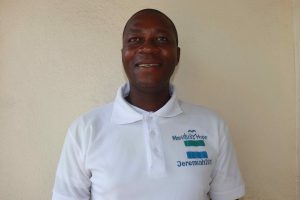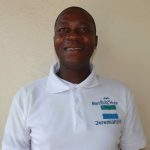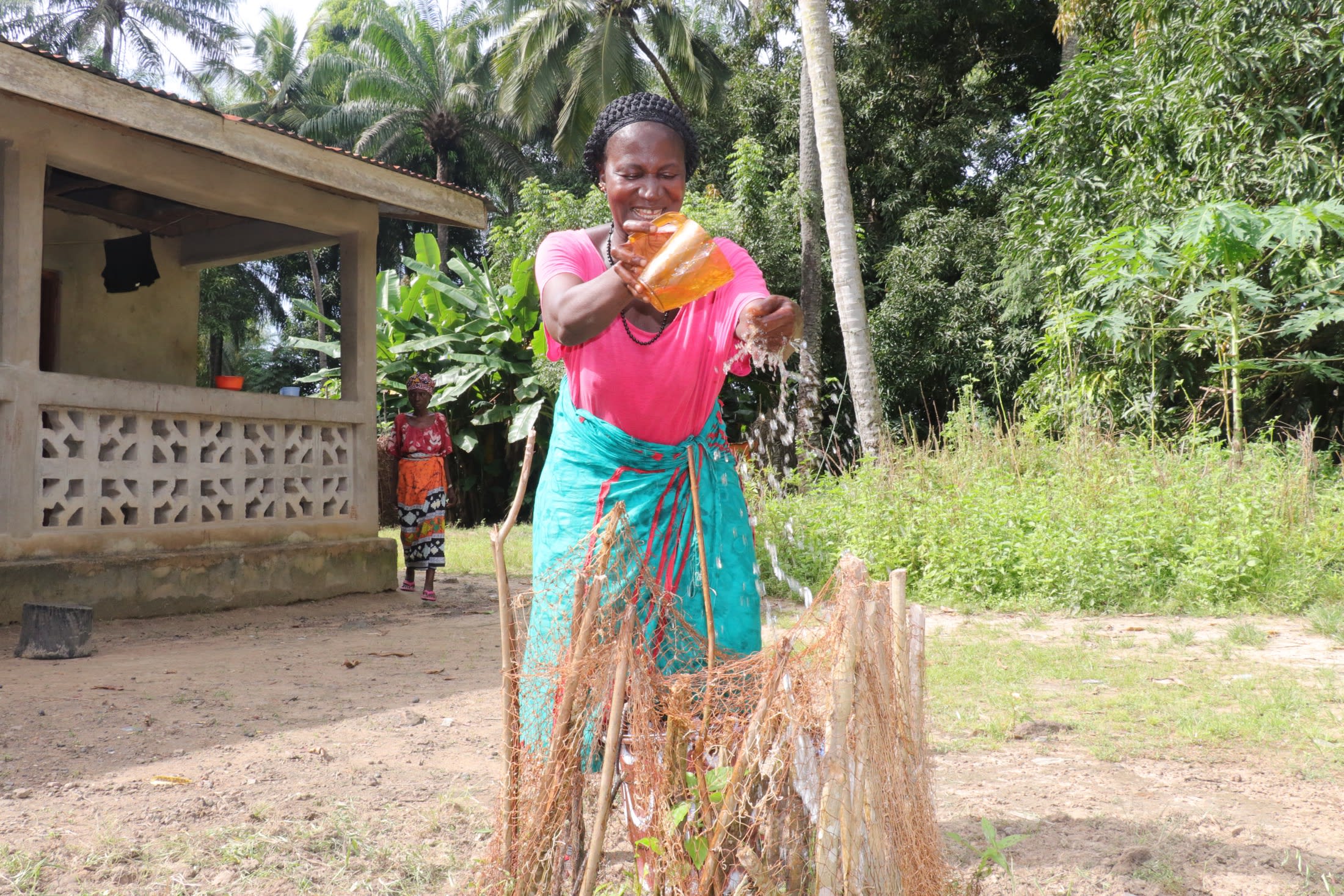February, 2023: Mountain Community New Borehole Well Complete!
We are excited to share that there is now a safe, reliable borehole well at Mountain Community. As a result, community members no longer rely on unsafe water to meet their daily needs. We also conducted hygiene and sanitation training, which focused on healthy practices such as handwashing and using latrines.
"I am extremely excited today for having a new water well next to my house," said 28-year-old trader Mariatu Kamara. "Since I have lived in this community, it [has] never been easy for me to fetch clean water to drink. It was also difficult to fetch enough water to complete all my daily activities. The only source that I used to fetch water [from] is the swamp well. It was not easy to fetch clean drinking water from the swamp, especially when it rain[ed]. The water could sometimes be brown in color, but I had no other source that I could regularly fetch clean water."

Mariatu celebrates with a container of water on her head.
"It is a great moment today that I can now easily fetch clean and pure drinking water just [a] few steps away from my house," Mariatu continued. "I now can fetch enough water to my house at any time. I now know that drinking from the swamp well will cause sickness. I learned this during the training that I attended before this well was dug. It was only by the grace of God that I was safe even when I was drinking from the swamp well. This new well is now the only source [where] I [will] fetch water to drink."
"I am very happy because my struggles [in] fetching water from the swamp are over," said 14-year-old Actimu K. "I can now easily fetch enough water from this new pump to my house. There is now enough water to use at any time that I need water to use."

Actimu collects water at the new well.
"It is not easy to wake up very early in the morning to rush to the swamp to fetch water," Actimu continued. "I could not fetch enough water in the morning because I [had to] go to school. My teacher [would] punish me if I [went] to school late. The swamp well is in a bush, and it is not safe. There are snakes in the bush, they might bite anyone at any time. It was always my fear to fetch water from the swamp because of the snakes. This new pump will now give me the opportunity to fetch enough water quickly in the morning before going to school. I will also fetch enough water after school before my parents return from the farm. I am very happy [about] this pump."
We held a dedication ceremony to officially hand over the well to the community members. Several local dignitaries attended the ceremony, including representatives from the Port Loko District Council and the Ministry of Water Resources. Each official gave a short speech thanking everyone who contributed to this water project and reminding everyone to take good care of it. Then, Mariatu and Actimu made statements on their community's behalf. The ceremony concluded with celebration, singing, and dancing.

"The community people were extremely excited on that day of [the] handing-over ceremony," said our field officer Philip. "During the celebration, they sang songs of appreciation in their local Themne language. The celebration left no category of people behind. Even the old people and little children immensely celebrated the handing-over ceremony."
New Well
The drill team arrived the day before beginning work. They set up camp and unpacked all their tools and supplies to prepare for drilling the next day. The community provided space for the team to store their belongings and meals for the duration of their stay. The following day, work began.
Our team dug two pits next to the drill rig, one for the drill’s water supply and another for what the drill pulls out of the borehole. In some cases, we order a private supplier to deliver the water for drilling since water access is already challenging.

Drilling.
Day one of drilling began as the team mixed water with bentonite, an absorbent clay, in the two dug pits. Next, the team fixed a four-inch carbide-tipped bit to the five-foot-long drill stem. They started the mud pump to supply water to the drill rig so that drilling could begin!
"We had a challenge on the first attempt," said field officer Phillip. "The first site was drilled until we met a rock at eight meters depth, which we were not able to break through. The only option that we had was to move to another site in the same community. We drilled the second site, and the drilling is successful."

Drilling near completion.
After putting each five-foot length of drill stem into the hole, the team took material samples. We labeled the bags to review them later and determine the aquifer locations.
On the second day of drilling, the team expanded the hole and cleared it of mud. After reaching a total depth of 20 meters, the team forcefully pumped clean water into the well to remove any dirt and debris from the drilling process. We then protected the screened pipe by adding a filter pack. The team hoisted the temporary drilling casing to fortify the pipes with cement.

Starting the yield test.
Next, we bailed the well by hand for three days before conducting a yield test to verify the water quantity. This well has a static water level of ten meters. With these excellent results, we installed a stainless steel pump. Water quality test results showed that this was clean water fit for drinking!

New Knowledge
Before conducting any hygiene training, we called and visited the local water user committee to understand the community’s challenges and lack of sanitation facilities. We shared the findings from our discussions with the committee members to help them make the necessary adjustments before the training began. For example, we identified households without handwashing stations or ones that may need to repair their latrines. With this information, community members worked together to improve hygiene and sanitation at home.
After this preparatory period, we scheduled a time when members from each household using the water point could attend a three-day hygiene and sanitation training. We then dispatched our teams to the agreed-upon location to hold the meeting.

Training topics covered included handwashing and tippy taps, good and bad hygiene habits, disease transmission and prevention, COVID-19, worms and parasites, proper dental hygiene, proper care of the well's pump, keeping the water clean, the cost recovery system, the importance of using dish racks and clotheslines, the importance of toilets, keeping latrines clean, balanced diets, the diarrhea doll, and HIV and AIDS.
We quizzed participants on what constitutes good versus bad hygiene behaviors. But when we showed them a picture of a woman fetching water from a stream where a dog was drinking, everyone became pensive.

"This session really captured the attention of the participants," said field officer Phillip. "They admitted that they have been drinking from the swamp well for quite a long time. They also had the tendency of drinking the same water [as] animals, including dogs. They revealed that they did not know about the implication of sharing drinking water with animals. They [had] no other water well where they [could] get water to drink. This topic really triggered more interest and participation from the participants."

Participants talk about disease transmission.
Another topic that prompted a lot of discussion was disease transmission. We split the participants into groups, giving them illustrations showing how diseases pass from one person to another.
"This is a very important training," said 39-year-old trader Adama Kamara, who was elected to be treasurer of the newly formed Water User Committee.

Adama.
"I have never gotten the opportunity to get this kind of training. I have learned so many lessons that will help to prevent me from getting sick. I now have ideas [about] taking good care of my community, the water that we are drinking, and how to personally take safe care of myself. I received more new knowledge concerning health and sanitation. I will also reveal this knowledge to those who do not attend this training so we can do the right thing together. I want to say thanks to you for giving me this opportunity and my community as [a] whole."
Conclusion
This project required a substantial collaboration between our staff, our in-country teams, and the community members themselves. When an issue arises concerning the well, community members are equipped with the necessary skills to rectify the problem and ensure the water point works appropriately. However, if the issue is beyond their capabilities, they can contact their local field officers to assist them.
Also, we will continue to offer them unmatchable support as a part of our monitoring and maintenance program. We walk with each community, problem-solving together when they face challenges with functionality, seasonality, or water quality. Together, all these components help us strive for enduring access to reliable, clean, and safe water for this community.
With your contribution, one more piece has been added to a large puzzle of water projects. In our target areas, we’re working toward complete coverage of reliable, maintained water sources within a 30-minute round trip for each community, household, school, and health center. With this in mind, search through our upcoming projects to see which community you can help next!
Thank you for making all of this possible!




 Borehole Well and Hand Pump
Borehole Well and Hand Pump
 Rehabilitation Project
Rehabilitation Project

































